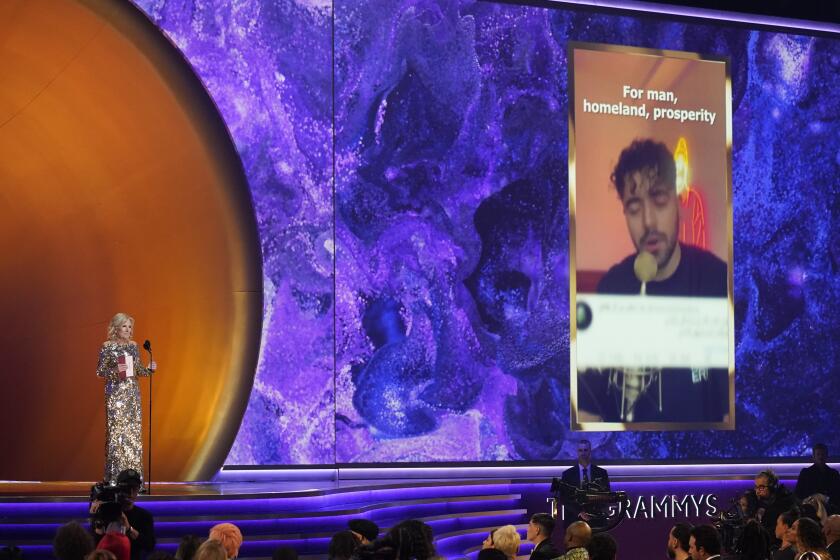Grammys to Settle Another Complaint
Seeking to quietly resolve another legal dispute, the Grammy organization has offered to pay an unspecified settlement to a former accountant who possesses internal documents that her attorneys say raise questions about financial mismanagement at the nonprofit group.
As part of the settlement proposal, Karen Gruhlke, a certified public accountant who worked for the organization for almost six years, agreed to drop her suit for wrongful termination and return the sensitive documents to the National Academy of Recording Arts and Sciences, according to two Grammy sources who asked not to be identified.
In return, the academy agreed to drop its $4-million countersuit against Gruhlke for failing to return the confidential documents.
The five-figure settlement was negotiated Dec. 7 during a 12-hour private mediation between attorneys for Gruhlke and the academy. Gruhlke’s case was expected to go to trial early next year.
An attorney for the Grammys confirmed that both suits had been resolved, but declined to comment further, citing confidentiality concerns.
Gruhlke and her lawyers, William Romaine and Doug Long, also declined to comment.
In papers filed in Los Angeles Superior Court, Gruhlke’s attorneys noted that some of the documents “may very well contain information that evidence criminal conduct” on the part of the nonprofit group. Had the case gone to trial, Gruhlke and other accounting employees were expected to be called to testify about the documents, which, at one point, were turned over to federal authorities.
Interviews with three Grammy sources, case documents and internal Grammy records obtained by The Times show:
* Grammy chief Michael Greene was alleged to have authorized the forging of a $266,808.60 bonus check to himself. The check, dated July 21, 1997, was allegedly discovered in 1999 by the head of business affairs during preparation for a Justice Department audit of the group.
* During that audit, Grammy employees allegedly hid sensitive financial documents in a file in an executive bathroom at Grammy headquarters in Santa Monica.
* Grammy executives allegedly racked up thousands of dollars in personal expenditures on corporate credit card accounts for which the nonprofit group was never reimbursed. In Greene’s case, $22,000 worth of personal items, including $8,000 in furniture for his home and a $3,800 stereo for his truck, were allegedly written off as company expenses.
Greene declined to comment, but a Grammy lawyer said the academy vigorously denied the allegations.
This is the second time in as many months that the Grammy organization has decided to settle a controversial employment dispute.
In October, the board of trustees authorized a $650,000 payment to Jill Geimer, a top Grammy executive whose attorneys had threatened to file a sexual harassment and battery lawsuit against Greene. Grammy sources say Geimer is expected to receive a check as soon as lawyers for both sides finish hammering out the final language in her exit agreement.
The claims by Geimer attorneys Gloria Allred and Nathan Goldberg are the latest in a string of internal harassment and discrimination complaints against Greene by six other employees. Several of those complaints were settled out of court.
Greene has denied all of the allegations. An internal Grammy inquiry conducted five years ago cleared him of any harassment allegations. While denying allegations raised by Geimer, Greene recently said he authorized her settlement to prevent any disruptions of preparations for the Grammy awards telecast in February.
Veteran private investigator Jack Palladino has been hired by the academy board of directors to look into claims of harassment by Geimer and other former employees and is expected to deliver a report to the board in a few months.
Last week, the group’s finance committee raised concerns about the price tag of the new investigation as well as the escalating cost of legal fees and settlement payouts. Gruhlke’s dispute with the Grammy organization began in January after she sued the group for reneging on a telecommuting employment arrangement set up by her former boss. That arrangement was created in the summer of 2000 after Gruhlke notified the academy that she intended to resign to get married and move to Visalia.
The telecommuting arrangement apparently worked adequately for six months as the academy shipped hundreds of confidential financial documents to Gruhlke’s home in Visalia to allow her to continue her duties in the accounting department.
In January, Gruhlke was abruptly fired by Jill Geimer. Gruhlke immediately filed a wrongful-termination lawsuit.
Four months later, the nonprofit group countersued Gruhlke, contending she wrongfully retained thousands of confidential documents, including sensitive personnel data and financial records.
Court records include correspondence between the parties indicating that, instead of returning the documents to the Grammy organization, Gruhlke’s attorneys turned them over to the Internal Revenue Service and the U.S. attorney’s office in Los Angeles.
At the time, Greene was under investigation by the IRS and the Justice Department for possible financial improprieties. The government closed the probe without filing charges, law enforcement sources said.
Federal agents returned the documents to Gruhlke without taking action, according to a letter from Grammy attorneys.
More to Read
The biggest entertainment stories
Get our big stories about Hollywood, film, television, music, arts, culture and more right in your inbox as soon as they publish.
You may occasionally receive promotional content from the Los Angeles Times.






